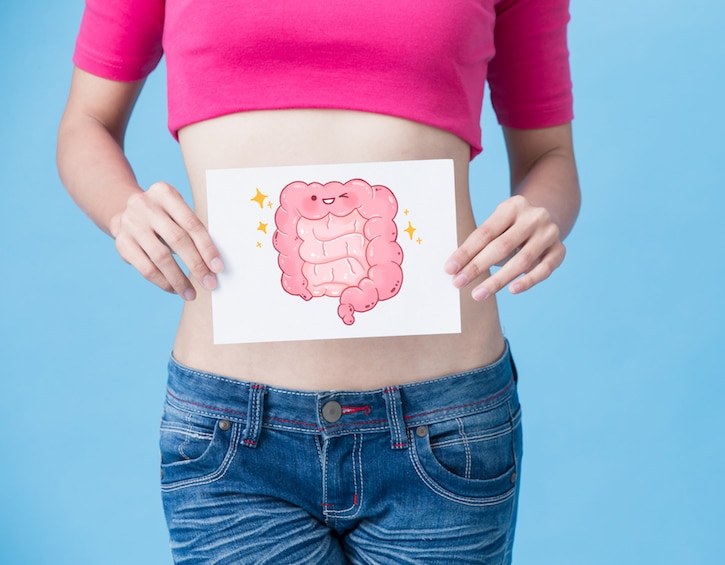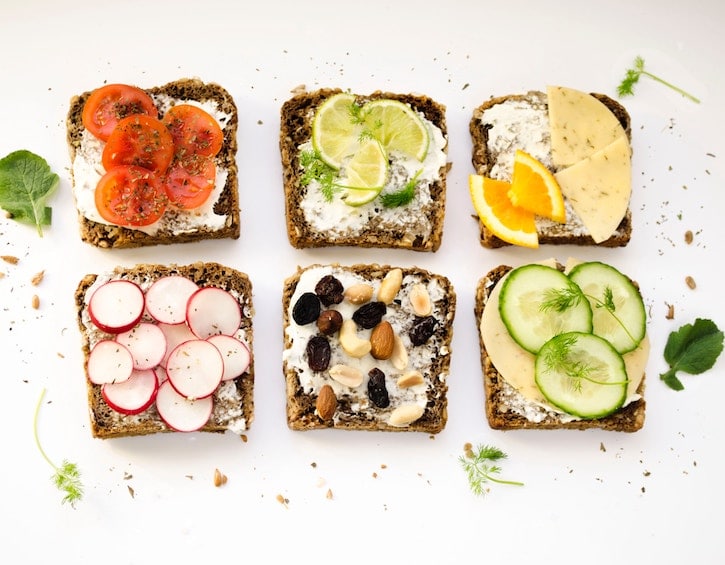

Happy tummy, happy health.
Over the last decade, the gut microbiome and gut health have become one of the most exciting fields in medical research. This was sparked by a team of researchers finding that gastrointestinal issues, such as irritable bowel syndrome, are directly correlated to mental health problems. So while many of us might take our digestive system for granted, we take a look at why gut health is more important for our overall wellbeing than you think. Body chemistry and holistic expert Angie Tourani explores how your gut affects not only your digestion, but also your mental state, and shares tips on what you can do to help.
Jump to:
What is the gut microbiome?
The gut-brain connection
Anxiety and Stress: How it’s linked
5 ways to improve gut health
What is BodyTalk therapy?
Read more: Mental Health And Stress: How Your Mind Affects Your Overall Health


What is the gut microbiome?
Amazingly, within our digestive tracts lives a vast ecosystem of 100-trillion organisms comprised of bacteria, yeasts, fungi, viruses, protozoans and eukaryotic parasites, altogether weighing up to 2kg (heavier than the average human brain!). Increasingly, this microbiome is being looked at as another organ in its own right. These little beasts make up 90% of the cells in our body, far outnumbering our own human cells despite their much smaller size.
The gut-brain connection
So why should this be on our mama radars? Well, part of the reason this microbiome is so important is because of its prime location in the gut. The digestive system has its own “brain” (the enteric nervous system) consisting of approximately 100-million nerve cells and 500-million neurons in and around the gastrointestinal (GI) tract. Now that’s a lot of feelers!
Experts have been long aware that the brain sends signals to the digestive tract via the sympathetic (fight or flight) and the parasympathetic (rest and digest) nervous system, like hormones that say “Stop breaking down food. There is a lion here! RUN!” However, scientists have recently become a lot more interested in what the “gut-brain” is communicating back. It has been discovered that a lot of the signals coming from the gut are actually coming from the multi-trillion strong community of “good” bacteria and microorganisms in our digestive tract. Additionally, they have been found to help vastly in synthesising vitamins, digesting food and assisting in the responses from our own immune system to harmful pathogenic bacteria (a.k.a. the nasty bugs that cause disease).


Anxiety and Stress: How it’s linked
Because of this brain-gut connection, stress and a variety of other negative emotions such as anxiety, sadness and anger can all affect the gastrointestinal (GI) tract system. These triggers can speed up or slow down the movements of the GI tract and the contents within it, making the digestive system overly sensitive to bloating and other pain signals. Bacteria can then more easily cross the gut lining and activate the immune system inflammation pathway, or negatively changing the makeup of the bacteria in the gut. Research with rat pups has shown that when they are exposed to excess early life stress, their gut microbiome in adult life is significantly different than healthy mice. That’s why stress and strong emotions can contribute to, or worsen, a variety of GI conditions such as inflammatory bowel disease, irritable bowel syndrome (IBS), food allergies and sensitivities.
Conversely, there is a strong belief in the fields of neuropsychology and the study of mental health that depression, schizophrenia, bipolar disorder, and other psychological or neurological disorders are related to imbalances in the gut microbiome. Scientists hypothesise that any disruption to the normal balance of bacteria may cause the immune system to overreact or be malnourished, resulting in inflammation of the GI tract, and leading to progress symptoms of disease both in the body and the brain. Healthy gut microbiome balances our brain and lowers our sensitivity to stress.
Gut-Brain contains the key neurotransmitters for mood, which are activated by healthy gut flora, thus influencing our emotional health. 90% of all serotonin – the hormone of well-being, happiness, learning, and appetite – is synthesised in the gut brain. Thus deforestation of the gut microbiome (by antibiotics for example) has been associated with higher stress, anxiety, depression, and poor memory functioning.
Read more: Useful Over-The-Counter Medicines, At-Home Remedies And Natural Cures


5 ways to improve gut health
Our modern lives are very different from the hunter-gatherer ways of early man. While the field is still being studied, a few things have been found to have a direct effect on our microbiome. The key to restoring (or maintaining) the health of your gut microbiome comes from keeping a balance in favour of beneficial bacteria in your digestive tract. Here are some tips to get your gut back on track:
1. Breastfeeding for baby’s health
Breast is best as they say! If you’re able to breastfeed, or pump and bottle feed, it is one of the best ways to set your little one up on the right path from the start. Breastfeeding shapes infants gut microbiome at what is known as “the window of opportunity”, a time where individuals gut microbiome is especially malleable and susceptible to long term change. This is done both directly through the passing of healthy bacteria from mother to child via milk, and indirectly through the mother’s passing of prebiotics (known as oligosaccharides) that support a healthy gut, antibodies, antibodies, and enzymes. While formula provides children with the basic hydration and nutrients they need, it does not give children the dynamic additional benefits of breastmilk.
2. Diet
Fibre is crucial to gut health and should be at the top of every mamas list! It is the bread and butter (so to speak) of the trillions of microorganisms in your gut. A new systematic review and meta-analysis into the gut microbiome, however, concludes that some types of fibre benefit the gut microbiota more than others.
3. Prebiotics and Probiotics
Prebiotics are essentially bacteria food and different bacteria eat different types of fibres. Feed your bugs by eating a lot of fibre from different sources. Probiotics are strains of bacteria that come in capsule form that can sometimes be hard to find otherwise. Specific bacteria has shown improvements in mood and anxiety in both animal and preliminary human trials.
Since your digestive tract should have thousands of different strains of bacteria, adding back a handful can be a bit like throwing a thimble full of water into the ocean. However, probiotics taken consistently can help with gut health, especially if you have taken a lot of antibiotics over the course of your life. Alternatively, eating a variety of fermented foods such as kimchi, sauerkraut, kombucha, apple cider vinegar, yoghurt, and miso is a natural way to increase the probiotic strains of bacteria.
4. Avoid antibiotics if you can
While antibiotics can be lifesaving and of course recommended when prescribed by a doctor, it’s been found that they can actually kill off huge amounts of healthy bacteria in the gut. Short term effects include diarrhoea and fatigue, while long-term links to allergy and obesity are being studied.
5. Try a BodyTalk treatment
The holistic healthcare system BodyTalk has synthesised the research on the gut microbiome to develop effective techniques that work to “reset” the immune system, flush out over-reactive inflammatory and allergic states, while also contributing to the maintenance of healthy gut flora. BodyTalk treatments amongst other things can:
- Mitigate the negative impact caused by taking antibiotics at an early age, formula feeding and diet
- Resynchronise the nervous, endocrine and immune systems’ communication with the gut microbiome
- Address the underlying causative factors of health issues, that may include epigenetic markers, emotional stresses, environmental toxicities, and microbiome health
- Balance allergic reactions and food intolerances


What is BodyTalk therapy?
BodyTalk takes a natural based approach to the body and combines Eastern and Western medicine to address the entire person instead of one specific issue, in order to provide a unique “whole-healthcare”, a system which creates emotional, physical and physiological well-being.
The key concepts of the BodyTalk system are:
- The body is inherently wise and has an inborn ability to self-heal
- The cells and system within the body are in constant communication
- Stress hinders these communication networks and compromises the body’s natural healing ability
Therapy works on restoring the body’s innate ability to heal itself, by repairing these communication networks (and gut health can benefit greatly from this). Alternative therapy can be a great way to prevent future illnesses and maintain gut health, just remember to always check with your doctor to make sure treatments are compatible with any medication you or the family might already be taking.
Read more: Where To Do First Aid Classes And Courses In Hong Kong
Sources:
Dinan, T., Cryan, J., Regulation of the stress response by the gut microbiota: Implications for psychoneuroimmunology. Psychoneuroimmunology (2012) 37, 1369-1378
Wang, Y. Kasper, LH. The role of microbiome in central nervous system disorders. Brain Behav. Immun. (2014)
 View All
View All











 View All
View All





 View All
View All


 View All
View All











